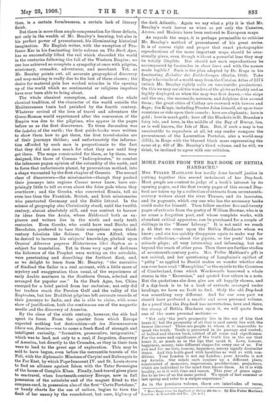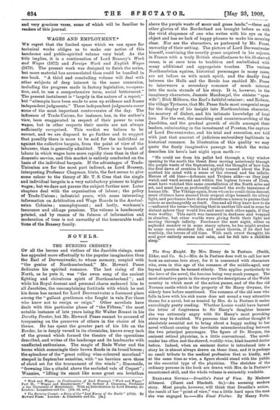MORE PAGES FROM THE DAY-BOOK OF BETHIA HARDACRE.*
MRS. FULLER MAITLAND has hardly done herself justice in putting together this second instalment of her Day-book.
Most people are content to judge of a book's interest by its opening pages, and the first twenty pages of this second Day- book are taken up by a collection of extracts from seventeenth- century writers about the river Thames, and its laureates, and its pageants, which any one who has the necessary books could make for himself. Then follow another five-and-twenty
pages of extracts from the poetry of William Browne, who is in no sense a forgotten poet, and whose complete works, with abundant critical apparatus, can be purchased for a couple of shillings in the "Muses' Library." It is not until we reach p. 45 that we come upon the Bethia. Hardacre whom we knew ; and she too quickly disappears again to make way for other collections,—about the gipsies, or the poets' birds, or miracle plays; all very interesting and informing, but not beyond the reach of other pens. Then there are further studies of seventeenth-century poets. Mrs. Fuller Maitland's gift is not critical, and her questioning of Langbaine's epithet of " pithy " as applied to Daniel makes us wonder whether she can ever have read "Musophilus," or the epistle to the Countess of Cumberland, from which Wordsworth borrowed a whole stanza in the " Excursion," and quoted four others in a note. But the quotations she does give are all happily chosen, and if a day-book is to be a book of extracts arranged under
headings, we have no fault to find. Only the old Day-book was something very different. And for our own part we should have preferred a smaller and more personal volume. As a proof that the Day-book has nevertheless, here and there,
the stamp of Bethia Hardacre upon it, we will quote from one of the more personal sections :—
" Not only the jest's prosperity lies in the ear of him that hears it,' but the prosperity of all that is said surely lies with the hearer likewise ? There are people to whom it is impossible to speak the truth. Truth is perverted in its passage and wasted ; or balked and thrown back, robbed of all sense and significance. For the sense and significance of the truth lies in the ear that hears it, as much as in the lips that speak it. Love, honour, happiness, misery, take different shapes for every one of us. For you and for me love, honour, happiness, misery signify dissimilar states. And this holds good with localities as well as with con- ditions. Your London is not my London ; your Arcadia is not my Arcadia. Our minds each conjure up a different place, constructed of memories, impressions, predilections, prejudices, which are individual to the mind that knows them. As it is with locality, so is it with time and season. This year of grace signi- fies to no two of us the same period. We speak of last summer or last spring and refer to a unique experience."
As in the previoUs volume, there are interludes of verse, • More Pages from the Daybook of Bethia lianktere. By Ella Puller Maitland. London: A. C.,witable and Co. CSC art.] and very gracious verse, some of which will be familiar to .readers of this journal.







































 Previous page
Previous page